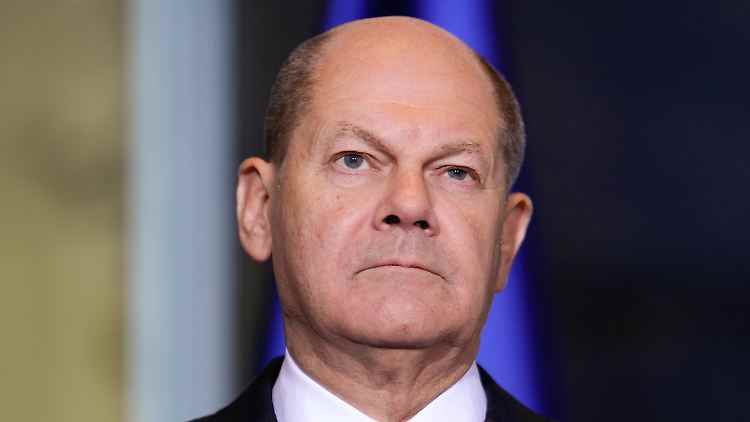person of the week
What grade did Olaf Scholz deserve?
By Wolfram Weimer
12/06/2022 11:02 am
The traffic light government gets miserable poll numbers for the first year, the political mood in Germany is bad. Instead of the announced progressive government, the country is experiencing a coalition with poor performance. The government sometimes feels like the DFB.
The traffic light government has been in office for exactly one year and has received the worst possible report from the electorate. Surveys show that two thirds of Germans are dissatisfied with the work in Berlin, and almost half even rate the work of the traffic light as “very negative”. Even 73 percent of all FDP voters, after all their party governs, are dissatisfied. In East Germany, 80 percent of the total population now lower their thumbs. The nation’s collective grading conference does not come up with a good, even a fair, result. In short: the mood of the traffic light is miserable. grade 5

The chancellor party SPD has lost one in four of its voters since the general election.
(Photo: picture alliance / Flashpic)
If the Germans could vote again today, the three traffic light parties SPD, Greens and FDP would no longer have a majority. The chancellor party has dropped to 18 to 20 percent in the polls, meaning that the SPD has lost one in four of its voters since the federal election. Social Democracy is now a full ten percentage points behind the CDU/CSU and just a few points ahead of the AfD. All the alarm sirens go off in the Willy-Brandt-Haus, because with this mood you will probably lose the upcoming elections in Berlin, Bremen, Hesse and Bavaria in 2023.
Can the coalition even hold out for a legislature?
The SPD chairman Lars Klingbeil therefore does not gloss over the situation and reprimands the governing coalition with unusual openness. Reforms must finally be speeded up and “less public dispute” is important. Klingbeil railed that the government was conducting its ongoing dispute “too long, too publicly, too personalized.” The fact that the leader of the Chancellor’s party is reading the riot act to his own people shows how bad the situation in Berlin really is.
The months of tug-of-war over the nuclear power plants, the debacle over the gas levy and mandatory vaccinations, the constant missteps of the defense minister, the embarrassing resignation of the family minister, from fracking to refugee policy – the series of disputes is amazingly long. Key ministers are locked in open hostilities, a major cabinet reshuffle is being considered and internal gossip about the “Scholzomat” in the chancellery is mounting. The question of whether this traffic light coalition could even hold out for a legislature is circulating louder and louder in Berlin. The more sensitive journalistic minds register “centrifugal forces” and “target-political discrepancies”, more solid colleagues already imagine a “chaos troop” in disintegration. Just because so many journalists feel green, the collective journalist grade should still be just about satisfactory (3-).
Population gives the traffic light a 4.1
In an interview, Klingbeil surprisingly openly gave the government a “3+” annual balance sheet rating. Now a chancellor party always has to whitewash the performance of their government and rate it two grades too well, so that Klingbeil’s 3+ in the finalized political language means a perceived “poor”. The head of the CSU state group, Alexander Dobrindt, of course picks this up and judges: “If you were to grade dispute, the traffic light would even have deserved a 2. Unfortunately, the government work gets a smooth 5.”
According to an Insa survey, the traffic light currently has an average rating of 4.1 among the population. This expresses the fact that the majority of Germans are quite disappointed with this government, but do not see it as a catastrophe in the history of the Federal Republic of Germany and give it another chance. One has to give the traffic light credit for the fact that, as a three-way constellation, it has a fundamentally difficult power structure. In addition, this government was burdened with a heavy burden with the Ukraine war. It didn’t manage this crisis brilliantly or skilfully, it acted short of breath and uncertainly, but it found a course to support Ukraine and mitigate the domestic political consequences with lots of double-boom money.
Olaf Scholz can be credited for giving an important turning point speech at the moment of the crisis and setting the right course. At the G7 summit in Elmau and at the G20 summit in Bali, he was able to position Germany as a balanced regulatory power. Foreign Minister Baerbock cuts a good figure on the diplomatic stage, but has little assertiveness. On the plus side there are also serious ministers and intelligent spokesmen like Cem Özdemir from the Greens or Marco Buschmann from the FDP.
There is no sign of optimism
The negative balance includes the inadequate fight against inflation and the shutdown of nuclear power plants in the middle of Germany’s biggest energy crisis. Alongside the nagging internal disputes and debacles, there is also a severe foreign policy upheaval. After a year of government traffic lights, relations with France are in their worst state in decades. European policy is also downright poisoned because of German solo efforts, the most recent summit was a ostracism. This foreign policy dislocation is literally “insufficient” in the midst of a European war crisis.
The biggest omission, however, is the lack of a regulatory policy and the failed communication for Aufbruch. The traffic light does not live up to its own central claim. “Dare to make more progress” was the motto of the 177-page coalition agreement, which was praised as a “document of courage and confidence”.
But after a year, Ampel-Germany shows exactly the opposite: discouraged and pessimistic. The republic is more reminiscent of a gigantic DFB, encrusted with functionaries, old rich, complacent, trapped in old structures, overly politicized, but far underperforming. You are slipping further and further in international competition and you are not doing anything decisive about it. The promise made in the traffic light announcement that Germany would finally become a progressive country again has been completely lost. This government has not even created a digital ministry for the 21st century, but has reactivated a superfluous building ministry from the depths of the past that is embarrassingly short of its own new construction targets. On the anniversary, a spirit of optimism and the courage to modernize are as far away as a soccer world championship title. Olaf Scholz and his cabinet did not succeed in triggering an innovation impulse and rekindling the fire of success of the Germans with gripping speeches, creative reforms and clear course setting. That’s why Olaf Scholz’s chancellorship only feels “sufficient”. The Germans could also make good or very good progress.
